- Health Conditions A-Z
- Health & Wellness
- Nutrition
- Fitness
- Health News
- Ayurveda
- Videos
- Medicine A-Z
- Parenting
Didn’t Work Out In A Year, Changed Her Diet: Vidya Balan Opens Up On Losing Weight By Removing Inflammatory Foods

Vidya Balan Weight loss Diet
When Bollywood actress Vidya Balan recently revealed the secrets behind her weight loss, it wasn't the usual story of rigorous exercise and intense dieting. Instead, she opened up about a gentle, yet transformative approach—an anti-inflammatory diet. Vidya’s experience has resonated widely, shedding light on an often overlooked aspect of wellness and weight loss: the role of inflammation in managing body weight.
“All my life I have struggled to be thin,” Vidya shared candidly in an interview with Galatta India. For years, she had tried endless diets and relentless exercise routines, only to see temporary results. “No matter what I did, my weight was only increasing,” she added. But this year, her approach changed entirely.
Instead of intense workouts, Vidya turned to an anti-inflammatory diet curated by the nutritional group Amura. Through this dietary adjustment, she noticed weight loss and relief from the symptoms of inflammation, like bloating and fatigue, without ever stepping foot in a gym. In her words, “The weight went like that because they eliminated foods that were not suiting me.”
Vidya’s story challenges the belief that all vegetables and healthy foods are beneficial for everyone. Despite being vegetarian, she discovered that certain foods—such as spinach (palak) and bottle gourd (doodhi)—were not compatible with her body and contributed to inflammation.
Inflammation and Weight Gain
Chronic inflammation is often at the root of stubborn weight gain, making it difficult for some to lose weight despite disciplined eating and regular exercise. According to experts, inflammation can lead to insulin resistance, hinder metabolism, and make the body more prone to storing fat, all of which contribute to weight gain.
When inflammation occurs, our immune system responds to what it perceives as a threat—this could be anything from stress and allergens to unsuitable foods. The response is a mix of physical reactions: increased blood flow, swelling, and the activation of immune cells, which can linger and cause chronic inflammation if not resolved.
What is an Anti-Inflammatory Diet?
The anti-inflammatory diet, as recommended by Harvard Nutrition Source, helps calm the immune system by choosing foods that reduce inflammation. This dietary approach encourages a balance of fruits, vegetables, healthy fats, whole grains, and other nutrient-dense foods while avoiding those that trigger inflammation.
Contrary to popular belief, inflammation isn’t always bad; it’s a natural immune response that helps heal the body. For example, we feel pain at an injury site to signal caution, and blood flow increases, causing warmth or redness to repair tissues. Problems arise when inflammation persists, leading to various health issues—including weight gain.
Foods That Reduce Inflammation
Here’s a look at the foods Vidya might have included in her anti-inflammatory diet and the specific benefits they offer:
- Rich in vitamins, minerals, and antioxidants, foods like berries, leafy greens, and cruciferous vegetables (broccoli, cauliflower) help neutralize free radicals that cause cell damage.
- Fiber helps regulate blood sugar levels, reducing insulin spikes that may lead to inflammation. Choices include oats, brown rice, and quinoa.
- Monounsaturated fats, like those in avocados, olive oil, nuts, and seeds, support heart health and reduce inflammation markers.
- Fatty fish (salmon, sardines, mackerel) and plant sources like walnuts and chia seeds are excellent anti-inflammatory agents.
- Ingredients like turmeric and ginger have natural anti-inflammatory compounds. Regular use of these spices adds flavor and potential health benefits.
- Dark chocolate (70% cocoa or higher) and green tea contain antioxidants that can reduce inflammation markers.
Foods to Avoid Inflammation
Just as important as adding anti-inflammatory foods is limiting those that can fuel inflammation:
- Soft drinks, sweetened juices, and energy drinks lead to blood sugar spikes, which can trigger inflammatory responses.
- Processed carbs like white bread, pastries, and refined pasta can increase blood sugar and inflammation.
- Foods like bacon, sausage, and other processed meats contain preservatives that may lead to inflammatory responses in the body.
- Full-fat dairy products, fatty cuts of meat, and oils high in trans fats should be minimized to support heart and metabolic health.
Vidya Balan’s Take on Body Positivity and Individuality in Health
Vidya’s journey also highlights the importance of respecting our individual needs. “A lot of times, people put on weight for various reasons…our bodies express what we are going through emotionally,” she said, emphasizing the relationship between mental health and physical wellness. Through her own experiences, Vidya learned to let go of strict workout routines and trust her body’s needs.
When people asked her about her “secret,” Vidya’s answer was simple: “I am just enjoying myself and feeling healthier than ever.” Her approach advocates for understanding one’s unique body requirements and not following someone else’s routine blindly.
In addition to diet, other lifestyle factors also help reduce inflammation. Regular exercise, managing stress, and getting enough sleep can complement the benefits of an anti-inflammatory diet, resulting in a healthier, more balanced life.
Vidya’s journey is a testament to the power of personalized health strategies and the potential impact of reducing inflammation on weight and overall well-being. Her story serves as an inspiring reminder to honor our bodies, embrace individuality, and focus on long-term wellness over fleeting fitness fads.
Disclaimer: This article is for informational purposes only and not a substitute for professional medical advice. Always consult a healthcare provider regarding any health concerns.
6 Foods That Helps You With Muscle Recovery

Credits: Canva
When you lift heavy or workout, you feel like your muscles have been strained, this is because before you muscles are build, there are small muscle ruptures. More than exercise, what matters is what you eat to help you muscles recover. The process is called hypertrophy, when intentional, controlled micro-tears caused by resistance training trigger the body to repair and strengthen muscle fibers. This process requires a specific cycle of damage, rest, and nutrition to be effective.
University of North Carolina Health Wellness Services manager and a certified personal trainer Kathy DeBlasio also explains, "You make microtears in your muscles when you work them. As you heal, you gain muscle and strength." She explains that these tiny tears cause you to feel pain, but they heal within 24 to 48 hours. What matters the most is your diet. There are different foods that help you recover your muscles. Here is a list of 6 foods for you to consume for muscle recovery.
Chicken
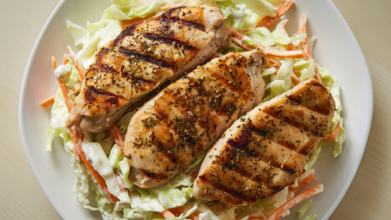
Duke Health notes that chicken breast is a lean source of high-quality protein essential for repairing and building muscles. It is also rich in amino acids, especially leucine, which is important for muscle synthesis. A 2024 study in Physiological Reports, noted that chicken intake, combined with resistance training on muscle mass has helped improve strength and muscle mass of elderly women.
Cottage Cheese
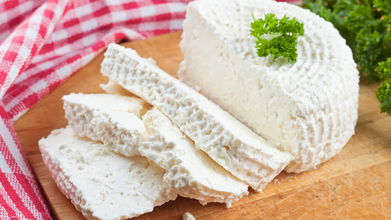
Registered dietitian Maddie Pasquariello, RD told Paloton, “Cottage cheese can be a very nutritious addition to your diet from both a macro- and micronutrient standpoint." Pasquariello explained that half-cup serving of full-fat cottage cheese packs around 13 grams of protein. It helps as a building block of muscles, bones, cartilage, skin, hair, and nails. It also helps build and repair tissue. It oxygenates red blood cells to nourish your body with nutrients, helps regulate hormones, supports the production of enzymes used to digest food and create new cells. It also helps in repairing and building muscles.
Potatoes
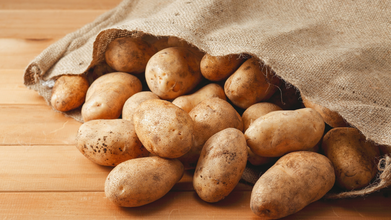
A 2022 study published in the journal Medicine & Science in Sports & Exercise (MSSE) notes that that potatoes contain a 1.5 per cent protein based on their based on their fresh weight. However, when potatoes are used for starch extraction, a residue remains, that can be used to extract potato protein. Ingestion of 30 g potato protein concentrate increases muscle protein synthesis rates both at rest and during recovery from exercise.
Read: 14 Drinks Or More A Week Could Increase You Risk Of Colon Cancer By 25%
Pomegranate Juice
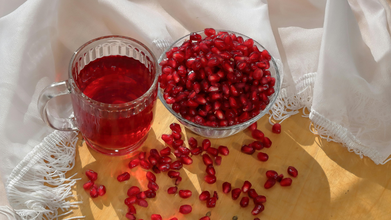
A 2016 study published in PLOS One notes that pomegranate supplementation accelerates recovery of muscle damage and soreness and inflammatory markers after a weightlifting training session. The study notes: "optimal dose of pomegranate supplementation, showed that either once-daily or twice-daily dietary pomegranate juice supplementation improves strength recovery of both leg and arm muscles after an unaccustomed eccentric exercise."
Eggs

Natalie Rizzo, MS, RD, a registered dietitian, specializing in sports writes: "Eggs have a unique nutrition profile that is great for athletes of all ages. While they make a nice addition to any meal of the day, the nutrients in eggs can help with recovery after exercise."
Fatty Fish
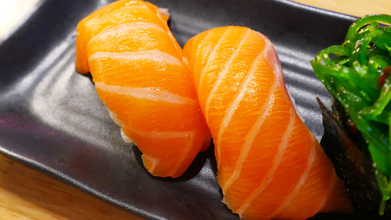
A 2024 study published in Clinical Nutrition ESPEN notes that omega-3 fatty acids in fatty fish could help increase muscle strength, however it does not increase in muscular mass. The study notes: "The interventions of omega-3 fatty acids supplementation and resistance training show promise as a countermeasure against muscular dysfunction."
The 4 Foods You Should Eat To Boost Collagen

Boost Collagen With These Superfoods (Photos: Canva)
Collagen is essential for maintaining firm skin, prevent premature aging and regulates cell proliferation. While it is usually found in animal sources, many fruits and super foods acts rich sources.
Why Does Collagen Fall as You Age?
Collagen production begins to decline in mid 20’s and falls to very low levels when you reach menopause. This occurs due to the nature process of ageing, because of which cells responsible for producing collagen become less active. Factors like sun exposure, smoking and stress can make it worse.Here are natural collagen rich superfoods, you can consume:
Vitamin C Rich Fruits Guava, Amla, and kiwi help stimulate collagen supporting skin repair and hydration.
Strawberries are rich in polyphenols, reducing oxidative stress, while oranges provide hydration and vitamin for rebuilding the skin. These fruits are catalysts essential for youthful and resilient skin.
Meats
Items such as bone broth, stock and chicken are rich in collagen. Fish offers omega 3, Omega reduces inflammation and prevents against chronic diseases. Egg whites contain proline and glycerin crucial amino acids which are organic compounds essential for building proteins and hormones in the body.Leafy Greens and Nuts
Spinach provides magnesium and antioxidants that preserve collagen. Nuts such as cashews and almonds rich in Vitamin E. Furthermore, pumpkin and flax seeds are crucial for maintain collagen stability.Supplements
Collagen is the perfect ingredient for glowing skin and it is all over the internet–coffee, Collagen is added to coffee by mixing peptides which dissolve easily in hot liquid and powders that give comparatively quicker results. Type 1 Collagen is usually considered the best for skin.
This Cheap Alternative to Blueberries Can Help Your Heart
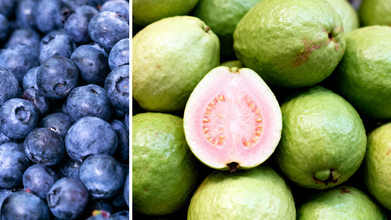
Guavas Better Than Blueberries (Photos: Canva)
Tiny but mighty, eating blueberries not only gives you a sweet taste but also can be extremely beneficial for your entire body.
Extremely rich in antioxidants called anthocyanins, they help with slowing down brain aging. Along with this, the fruit also helps regulates blood pressure and cholesterol levels, overall improving cardiovascular health.
Although they might sound beneficial, they are pricey and inaccessible to a majority of the public.
However, experts have now revealed that guava can provide the body with more benefits than blueberries at half the price.
Why Is Guava Better Than Blueberries?Guavas are living proof that appearances are deceptive. Packed with nearly five times more Vitamin C (about 228mg) and loaded with digestive fibers, this winter fruit is perfectly suited for everyday snacking.
According to Healthline, a single guava can fulfill 12 percent of your recommended daily intake of fiber. A 2025 overview by PubMed also shows that guava leaves have been researched for managing blood sugar levels.
Guavas contain soluble fibers which slow down the digestion and absorption of sugars, preventing sudden spikes in glucose levels. Previous research also shows that regular consumption can help improve insulin sensitivity and lipid profiles, benefiting metabolic health.
With significantly higher Vitamin C content than blueberries, this fruit supports collagen production and gives you brighter skin and protection against premature aging.
Which Other Fruits Are Rich in Antioxidants?
You might not have noticed that some fruits lying unwanted in your fridge might just be hidden gems: jamun, amla and pomegranates are also brimming with antioxidants that can support immunity and overall heart health.While cranberries support urinary tract health by preventing bacterial adhesion and reducing inflammation, strawberries are rich in Vitamin C and folate and help with blood sugar regulation which can help stabilize glucose levels.
After all the environmental damage and aging that you have caused your skin, it deserves the utmost care and protection to rebuild and glow.
While blueberries have been linked to improving skin texture, goji berries are far rich in flavonoids that can neutralize free radicals, boost collagen and protect against UV damage.
Blackberries and raspberries are excellent sources that reduce oxidative stress and inflammation.
Experts recommend incorporating a mix of these fruits in your diet to help repair your DNA, reduce inflammation and prevent chronic conditions.
© 2024 Bennett, Coleman & Company Limited

